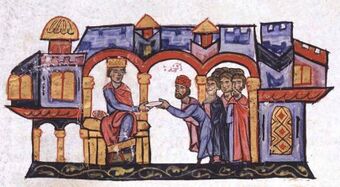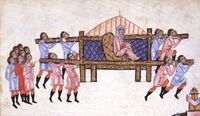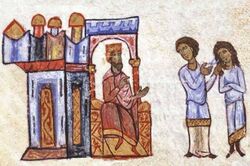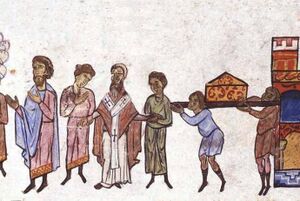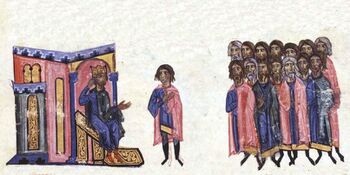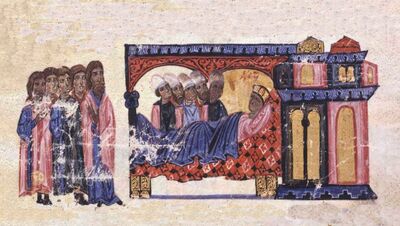Leo VI
“I am giving up women after wife number four.”
Byzantine emperor Leo VI is given the additional surname as 'the Wise' or 'the Philosopher'.[1] This indicates that compared to everyone else at the imperial court, Leo was something special. He could read and argue a case if necessary and could keep his beard well trimmed.
Early on in life Leo had survived a castration threat from his father emperor Basil I who had become convinced Leo was actually the the son of the notorious boozer emperor and Basil's immediate predecessor Michael III. Basil had been eventually talked out of carrying this threat to the Byzantine prince but it left a psychological scar (as it would anyone) on Leo's soul.
Early days[edit]
Leo was born in around 866. Officially he was the son of Basil the horseman, boon companion of emperor Michael III and his wife Eudokia Ingerina. This Eudokia was also the official mistress of Michael who was legally married to another woman called Eudokia (confusing!). When Michael was murdered in 867 in a conspiracy whose members included Basil, Leo's mother assured the new emperor that he was the father of Leo and a younger brother Stephen and that she had used 'protection' to prevent getting impregnated by her imperial master. Since every baby looks like Winston Churchill at these ages, Basil accepted Eudokia's assurance. The couple went on to have a son (later emperor) Alexander who was born a few years after Michael's death.
As Leo grew up it became physically obvious that he wasn't the son of Basil. Older courtiers said Leo looked like Michael, he even liked the same wine too. For awhile Leo and his brother Stephen were protected by their mother but she was banished from the court when details of her torrid affair with a government minister was revealed[2]. Basil blamed Leo for the empress's decision to seek sexual favours elsewhere and subjected him physical beatings.
Basil's suspicions of Leo were reinforced by the sudden death of his eldest son Constantine in 879. Constantine had been Leo's elder half brother by his 'father's' first marriage that had ended in divorce and had been a junior co-emperor with his father. Basil reluctantly made Leo co-emperor to maintain political stability but also elevated Alexander at the same time. Stephen indicated he wanted a career in the church to remove suspicion he was looking to become emperor. Basil made a note and filed in a hidden pocket.
Close Shave[edit]
In 882 aged 16 Leo was married to the super pious Theophano. He wanted to explore his youthful sexuality, she preferred candles and chanting to saints. The couple managed it at least one night of conjugal relations as they had a daughter Eudokia as a result but she died young. Since the marriage was Basil's idea it seems likely he was hoping that Leo would give up with the saintly Theophano and try hookers instead. However Leo kept to his studies and read widely in the expectation he would succeed Basil.
However the old emperor now had increasingly become suspicious of Leo and Stephen. Basil got it into his head that the boys would avenge their dead father. Empress Eudokia had died and so they lost their protection from her. Basil made his move. Stephen accepted his castration since he had no intention of creating his own dynasty and still wanted to be a priest. Leo was naturally more resistant. Basil had him thrown into prison threatening Leo he would be castrated and blinded as well. Though the threat wasn't carried out then Leo was well aware Basil could come for his goolies any time. Shortly after Basil died in a hunting accident that saw the latter dragged through a forest by an outraged deer unwilling to become venison. Hostile sources to Leo say this was his revenge on Basil, though how he communicated with the assassin deer isn't explained. In any event, there was now a vacancy for senior Byzantine emperor. Leo took it.
Emperor[edit]
Once installed as the full time emperor Leo immediately showed his true family feelings. Basil's funeral was a standard burial, no frills and no emotion. But for his real father Michael showed a lot more affection. He had Michael's remains moved from a shoddy little burial plot in a slum in Constantinople to the prestigious Church of the Holy Apostles. Leo got through three boxes of tissues weeping for his father.
In a surprise move, Leo also instructed the Orthodox Church to 'retire' Patriarch Photios. The latter had saved Leo from mutilation earlier (at least according to him) but Leo wanted his own man as patriarch. He chose his brother Stephen, a truly learned man at the age of 19. Leo's other brother Alexander kept his imperial title as long as he had no aspirations for greater political involvement. Alexander accepted that offer and would spend the next 20 years on a prodigious drinking and sexually promiscious run of the empire, in much the same way emperor Michael III had carried on earlier.
Internal changes[edit]
In the course of his extensive readings Leo had come up with some new insights. Why was the Byzantine Empire's inherited legal codes and such like still written in Latin?
Leo ordered that everything, including the work of the 6th century emperor Justinian I get run through the Greek google translate machine. Leo also ordered that the senate of the empire should lose any political influence and become a talking club. And whilst he was about it, why was the office of Consul still a thing? This ancient office that dated back to the early days of the Roman Republic had lingered on as a ceremonial post held by a ruling emperor. There had originally been two consuls but one had been lost in the post in the mid 6th century and the other had become just a title given to every Byzantine emperor for the past 300 years. So ended the last connection with the old Roman Empire.
External Affairs[edit]
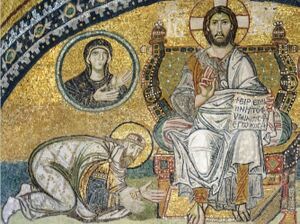
One bright spot for the Byzantines was the break-up of the Holy Roman Empire (Mark One) in the West. Briefly Charles the Fat had held the title of emperor, King of the West Frankies (Frogs) and King of the East Frankies (Jerries) until he was deposed from all of these and died. The Byzantines were therefore quite pleased to see the title of rival emperor end up as a power squabble limited to mainly nobles from Italy with a few German and French interlopers.
As a double bonus, the people the Byzantines blamed for supporting what they thought was a bogus emperor were the Vatican. In the 880s and 890s saw a number of popes murdered, deposed, or 'disappeared' as rival gangs tried to come out on top. One pope even had a predecessor dug up from his grave and put on trial for corruption. The Byzantines could be cruel but not absurd.
Whilst the war with the forces of Islam still continued and saw the loss of the last substantial base for the empire in Sicily in 902, the more pressing problem were the Bulgarians. Though now Orthodox Christians like the Byzantines, the Bulgars still wanted to be free of direct control. In a classic piece of diplomacy, Leo sent a bribe to the Bulgarians neighbours to the north east. These were the recently arrived Magyars or, as they were called by everyone else, the New Huns or Hungarians. These ferocious pagans did indeed attack Bulgaria but then moved further west and moved to the land that eventually took their name. Losing their ally, the Byzantines were forced to bribe the Bulgarians instead not to attack them.
Marriages[edit]
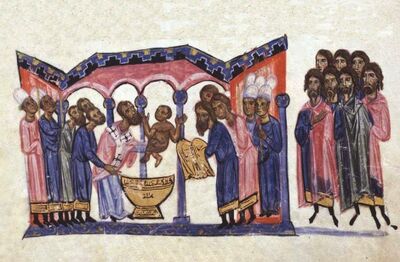
Leo's loveless marriage to Eudokia continued until he eventually persuaded to move into a nunnery. At the same time Leo had already established himself with a mistress called Zoe Zaoutzaina. When his first wife died in 897, Leo married her. Zoe Zaoutzaina died only a couple of years later, leaving behind two daughters. Leo now went for a third wife, her name was Eudokia. At this point the church authorities cited some religious text that forbade a man marrying more than twice. Leo's brother the Patriarch Stephen was already dead by this stage so it was his immediate successor Antony II who was required to do the necessary spiritual paperwork to let the marriage go through. He did what he was told.
However, in what was looking like some Divine Judgement working on Leo, Eudokia in turn died after two years of marriage. Leo's daughters by his first and second wives likewise appeared to have died young[3]. Holy men again said Leo had been a naughty emperor and ought to resign. This message was amplified by Leo's brother Alexander who encouraged discontent with the emperor.
Undaunted by his run of bad luck, Leo now fixed his gaze on another Zoe Karbonopsina. Starting out as a mistress, he upgraded her to Empress Number Four. This was done somewhat frantically as she had given birth to a son who was healthy and noisy. Leo wanted the boy to be his legitimate heir and named him Constantine. However, this was resisted by Patriarch Nicholas Mystikos who refused to recognise Leo's fourth marriage. The two men argued about this for two years as Leo liked a good debate but an emperor always wins these battles. Mystikos was deposed by Leo and his successor Euthymios sanctified the union at a price. Leo obligingly donated to all the good causes nominated by the church. It was an extensive and expensive list.
Death[edit]
Leo died in 912. His son Constantine VII had been crowned as a co-emperor in 908. Leo's brother Alexander had retained his imperial title and rights, despite rumours that he had tried to get his nephew castrated to prevent him succeeding his father.
References[edit]
- ↑ Leo could read a book without moving his lips.
- ↑ Eudokia Ingerina's lover was offered the choice of execution or going to a monastery. He chose the latter.
- ↑ There is a claim one of them called Anna was actually sent west to marry the Holy Roman Emperor Louis the Blind.
| Preceded by: Basil I |
Byzantine Emperor 886–912 |
Succeeded by: Alexander |
